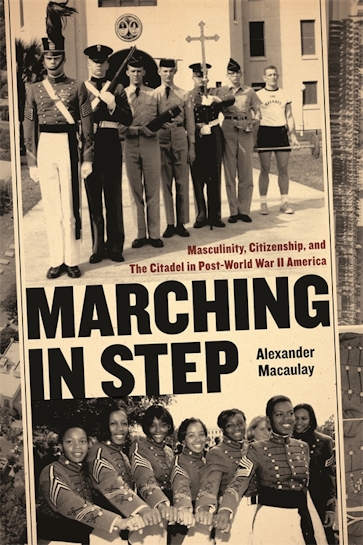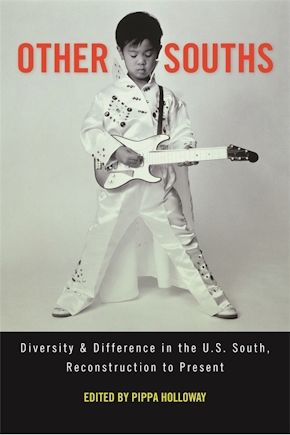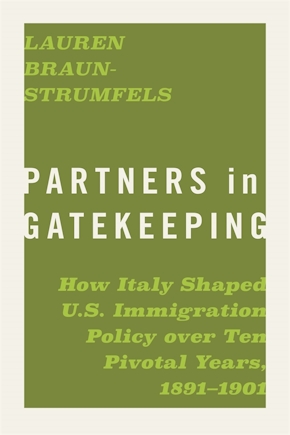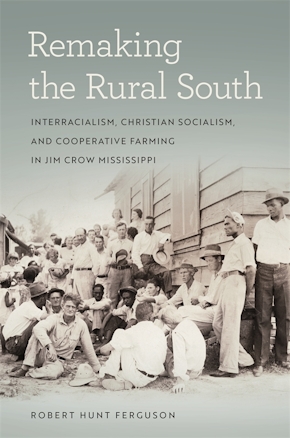Marching in Step
Masculinity, Citizenship, and The Citadel in Post-World War II America
Title Details
Pages: 308
Illustrations: 14 b&w photos
Trim size: 6.000in x 9.000in
Formats
Paperback
Pub Date: 03/01/2011
ISBN: 9-780-8203-3821-7
List Price: $34.95
Hardcover
Pub Date: 10/01/2009
ISBN: 9-780-8203-2651-1
List Price: $120.95
Marching in Step
Masculinity, Citizenship, and The Citadel in Post-World War II America
Skip to
- Description
- Reviews
Combining the nuanced perspective of an insider with the critical distance of a historian, Alexander Macaulay examines The Citadel’s reactions to major shifts in postwar life, from the rise of the counterculture to the demise of the Cold War.
The Citadel is widely considered one of the most traditional institutions in America and a bastion of southern conservatism. In Marching in Step Macaulay argues that The Citadel has actually experienced many changes since World War II—changes that often tell us as much about the United States as about the American South.
Macaulay explores how The Citadel was often an undiluted showcase for national debates over who deserved full recognition as a citizen—most famously first for black men and later for women. As the boundaries regarding race, gender, and citizenship were drawn and redrawn, Macaulay says, attitudes at The Citadel reflected rather than stood apart from those of mainstream America. In this study of an iconic American institution, Macaulay also raises questions over issues of southern distinctiveness and sheds light on the South’s real and imagined relationship with the rest of America.
This is a story that is bigger than one small school in a southern town. It is, as it should be, the story of America coming to terms with its past. From the Cold War to civil rights, from Vietnam to the feminist movement, The Citadel found itself on the front lines of America's culture wars. Thankfully, in Macaulay, we have found a historian of consummate skill to analyze those conflicts and their effects on the modern South.
—Steve Estes, author of Ask and Tell: Gay and Lesbian Veterans Speak Out
In spite of being a recent Citadel graduate, Macaulay presents a remarkably objective look at this uniquely isolationist collegiate culture and its often-visceral reaction to the progressiveness of the outside world. A must read for any student of the modern South or civil-military relations.
—Choice
In this highly engaging and perceptive study, Alexander Macaulay challenges the characterization of The Citadel as a hidebound southern anachronism. Macaulay’s post-Word War II Citadel is more a reflection of the larger society than a reaction against it, an institution forced to reconsider its gendered and racialized notions of citizenship as the ground shifted beneath its feet.
—Kari Frederickson, author of The Dixiecrat Revolt and the End of the Solid South, 1932–1968
Writing as both a historian and a Citadel graduate, Macaulay capably describes the experiences of cadets and school officials who struggled with social, political, and cultural changes in postwar America. His discussion of the shifting attitudes toward masculinity in the 1960s is especially convincing and clearly shows how The Citadel reflected national debates on a local level.
—Southern Historian
Engagedly written and fast paced, this is a first-class book worthy of being read by a wide audience.
—Joe P. Dunn, South Carolina Historical Magazine
Macaulay presents this astute account of South Carolina's military college, The Citadel, within the framework of masculinity and shows how concerns over manliness fueled both the school's leaders' and its students' ideologies and actions and reflected American, southern, and South Carolinian anxieties about the tumultuous social and cultural transformations that followed World War II. This is an authoritative institutional history based on Macaulay's perceptive understanding of his alma mater.
—H. Michael Gelfand, American Historical Review
Much more than an institutional history, this book's most significant contribution is to show how such a deeply gendered and racialized place responded to and helped shape American arguments about gender and citizenship.
—Journal of Southern History



